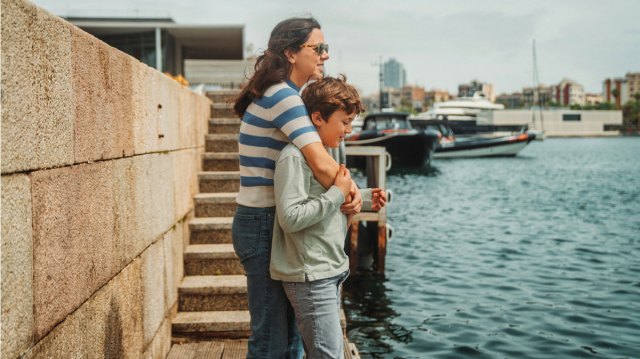Feeling like a broken record when trying to communicate with little people is pretty much par for the course in parenting. We also have that “annoying” tendency to spiral into long-winded explanations when trying to guide our kids’ behavior. But it’s important to remember that kids thrive on clear instruction and boundaries. And that sometimes involves fewer words than we think.
Nicole Black, a mom of three and the founder of Coffee and Carpool: Raising Kind Kids, recently shared some brilliant one-liners she’s been using with her family for over a decade. Even better, they work with kids of all ages: toddlers, school-aged kids, and even teenagers—which is saying something.
@raisingkindkids Parenting one liners that work to make parenting easier Like this gem: you can be mad without being mean. Add yours! parparentsoftiktokrparentingtipsrparentinghacksrparenting101srespectfulparentingi#raisingkindkids
♬ original sound – Nicole- Raising Kind Kids
1. Every family has different rules.
You’ve probably heard your child complain about why their friends get to do things they don’t. This simple statement explains it all. This is how our family does it, and that’s that. There’s no need to go into more detail.
2. We don’t comment on other people’s bodies.
This one-liner is important for families with older kids and teenagers, as that’s about the age when they start noticing differences in people.
3. Asked and answered.
This is particularly helpful for those moments when kids ask the same thing numerous times, hoping to wear you down and change your answer into something they prefer. Just keep repeating this statement, and eventually, they’ll get the hint. The best part is that you don’t have to keep saying “no.” Nicole says you can elaborate a bit if necessary, “I’m sorry if you don’t like the answer, but that’s the answer.”
4. Don’t yuck someone else’s yum.
Everyone has different preferences, likes, and dislikes. This is a “you do do, and let them do them,” moment. After all, if you haven’t tried that food, played that sport, or watched that show, how do you know it’s bad, dumb, or disgusting?
5. You don’t have to be friends with everyone, but you have to be friendly.
There’s a difference between making kids be friends with everyone and encouraging them to be kind. They can be friendly, they need to use their manners, but they don’t have to become tight with everyone.
6. Stop means stop; no means no.
Teaching kids about boundaries is important and this one-liner is basic but effective. It’s also important to enforce this consistently—even if someone is laughing while saying “stop” or “no,” it means what it means and it’s a clear boundary.
7. Is that a good choice for your body? Make better choices right now. [Or simply] Make good choices.
This is one of those one-liners that works for kids of all ages: when toddlers are being too adventurous and climbing the walls; when school-aged kids know better but might not want to listen; and when teenagers have more independence, and you won’t be by their side at every moment.
8. “I’m sorry” is just words.
Saying this will show them that they can say the words all they want, but the problem or situation won’t improve without changing their behavior.
9. Say what you mean and mean what you say.
Nicole says they don’t use sarcasm at home because a lot of times, it can be misconstrued. Communication is key, so get to the point!
10. Try again.
This one is perfect for tweens and teens who have discovered their attitude. Be sure to do it with a straight face and don’t give up. If you need a little extra explanation, Nicole says to add something like, “You don’t get to talk to me that way. I don’t talk to you this way. Try again.” Once they’ve managed to speak to you with even a little bit of respect, say “thank you” and leave it at that.
Related: 7 Smart Replies When Your Kid Makes a Rude Comment
11. Who is it funny for?
“Mom, it’s funny.” Is it, though? Pointing out that something might not be funny to everyone else, or that it could even be hurtful to someone is important, and asking kids to identify exactly who thinks it’s funny is brilliant.
12. Are you tattling or telling?
We want our kids to come to us with problems, but there’s a difference between the two situations. If someone is hurt or needs help, that’s “telling,” and if a kid is trying to get someone else in trouble on purpose, that’s “tattling.” Kids should learn the difference at an early age.
13. It’s okay to be not okay.
Recognizing and embracing big emotions in kids is always a good thing, whether they’re scared, nervous, sad, or angry. It’s how they deal with them that’s important.
14. Do you want help or do you want me to listen?
When kids get upset, sometimes they don’t know what they need, but they know they need something. Helping them identify what it is that you can do for them allows them to set boundaries of their own. Kids often feel like they don’t have much power, so giving them the choice is huge.
Some parents also left their own one-liners in the comments, and my personal favorite is “We keep surprises; we don’t keep secrets.” Everyone needs tools in their parenting arsenal, and these statements are exactly that—after all, there’s a good chance those long negotiations with persistent kids might be cut way, way down. And that’s a win for everyone.
